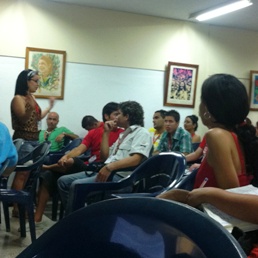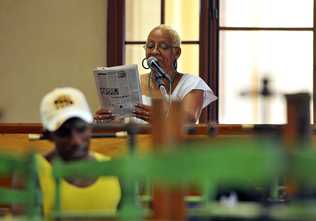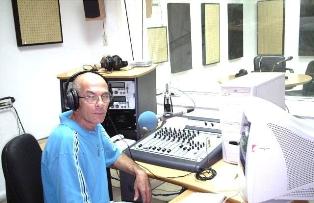The awarded programs were Demuestra que sabes ( University of Oriente ), Ciudad de of leyendas (University of Camagüey) , Canca de musico y loco (University of Havana ) and Muevete ( University of Computing Sciences ) , in the categories of education , cultural , and informational varieties , respectively.
There were 141 works in competition in the several categories of variety, musical, educational, cultural, sports, dramas, news programs and newspaper advertisements and documentary genres and the special category of script.
Other institutions of higher education such as the University of Medical Sciences of Pinar del Rio and the universities of Granma, Las Villas, Ciego de Avila and Las Tunas won special awards in the categories of speech, script, direction and sound editing as well as different categories.
With some of its participants and organizers talked on his radio for the task in different universities and on the relevance of the University Radio Festival, an event that takes place in Havana over 10 years ago, and which brings together many university students minded and to develop competitiveness in the media.
Arletty Sánchez Santos (Representative of the delegation in Havana. University of Computing Sciences)
“In the case of the UCI the university radio, which has the name of Radio Ciudad Digital, is transmitted through the 22 channel of the school. In addition to this possibility, students have the radio through the website Inter – Nos. The 22 channel is very tuned. We broadcast from 11 am until 3 pm, and after from 8 pm and until 12. There are many expectations and challenges that cover our radio program schedule for our attempts to cover all the information needs of the university community in the sporting, cultural, historical context…
“Every Friday we have a space on Radio Rebelde. Although we have argued that college radio needs more spaces within the provincial and national radio. For this is also the Festival, to encourage this type of proposal.
“In the ICU we lack trained to work on the radio regarding potential new students today. Students graduate and generally not taxed at Radio City continue. In September and February castings are made in different modalities such as script, voice, etc. . . We are keen approach to vocational training. That visit stations and try to create new contacts that can approach the UCI to give training courses.
There is clearly a fundamental premise and university exchanges with other broadcasters. We would like the venue moved to other provinces in future editions. “
Evelin Lopez Gutierrez (student of Spanish Literature career at the Faculty of Education in Alquízar , Artemisa )
“When we knew the call for the Festival, we were very happy to present a program by which we issued Radio base. As we are not professionals in the radio, the Festival allows us to understand the work of students from other schools is.
” Training is something important. Since the beginning, the participants of Festival have given several lectures on speech, production. That makes us grow, to work better. Some in the Radio base wanted to get closer to the stations in the province to seek support in terms of the ability. “
Dayana Macías (Announcer of program Con acento cubano. Radio Taino)
“I think this is important for young people to express their ideas further and develop a passion for radio forum. University radio broadcasters have events like this in the perfect setting to develop their interests, to be the voice of the problems that may exist in the different faculties that make their universities. I think you have to take this time to be felt.
“In Radio Taino, for example, we also open the door for young graduates. In fact in my program Cuban accent, every Monday, we have a section called Here I am where young guests talk about their projects and concerns. That is why we have given the media coverage Festival since its inception. “
Jorge Jesus Becerra (Promoter of the national secretariat of the FEU)
” The Festival’s claim arises for students to have a broadcast media. For the importance of this, it is proposed to create a national network of college radio broadcasters who pay taxes directly to the movement of the FEU and correspondents, in turn, are correspondents or collaborators of the Cuban Radio itself. In fact the radio itself has already offered us a space on its website to spend on university radio.
“We can say that beyond the aim of encouraging the movement of broadcasters, we are at a time to create this network and that it becomes a reflection of college life at each center of the country.
“This year, the quality and number of works increased competition. It is the time that most provinces are given appointment in Holguin, Guantanamo and excluding the delegation of the University of Havana.
” For the first time we have almost 80 delegates to the Festival and over 140 jobs. From the VIII Festival broadcasters movement has grown, obviously. “
Translated by: Daysi Olano





